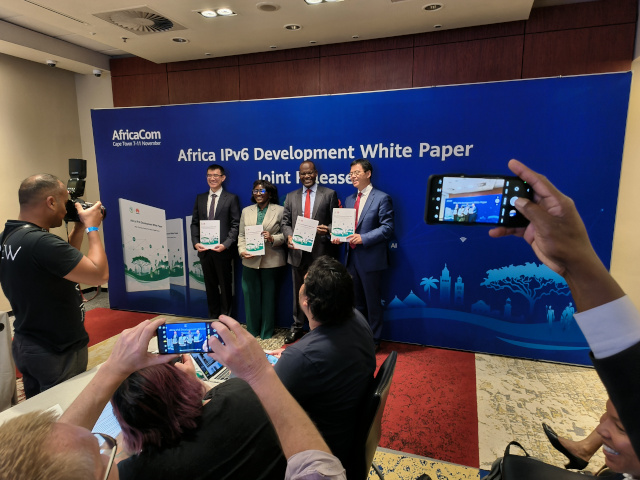IPv6 must become priority as Africa IPv6 Development White Paper released
By Staff Writer 8 November 2022 | Categories: news
NEWS SPONSORED BY rAge EXPO:
Africa’s move towards Internet Protocol version 6 (IPv6) should be accelerated if the continent wants to keep up with growth brought about by the digital economy.
This is the concern raised by Anderson Amlamba, director of the AU’s Management Information System, at the release of the Africa IPv6 Development White Paper yesterday in Cape Town by the African Telecommunications Union (ATU), African Union (AU) and Huawei.
Amlamba noted how digitisation has become a global strategy, as digital economies are growing faster than GDPs. As IPv4 addresses have become exhausted, IPv6 is becoming the cornerstone of digital development , helping to increase address space as the Internet of Things expands.
But Amlamba stated that while developed countries’ move toward IPv6 has been led through policies, such as the EU’s Action Plan for the deployment of IPv6 in Europe, African countries have been slow to adopt similar policies. By October 2022 the global IPv6 deployment rate stood at 40%, with Africa standing at 5%.
Launched during the fourth Broadband Africa Forum at AfricaCom 2022, the white paper aims to provide guidance and reference for IPv6 technology innovation and development in Africa, thereby accelerating the construction of network digital infrastructure and promoting the development of the digital economy on the continent.
The Africa IPv6 Development White Paper is the first regional white paper on the African continent which systematically analyses the development of IPv6 in Africa and shares the IPv6 innovation practices of several top operators in Africa.
Amlamba believes that as Africa looks to accelerate IPv6 development, governments across the continent should take the lead by formulating IPv6 strategic plans and policies, and promoting IPv6 organisation, industry, ecosystem construction and talent cultivation. John Omo, the secretary-general of the ATU, encouraged everyone to understand the importance and approaches for IPv6 migration and adoption. This, he said, is critical to the continued success of the internet in transforming the lives of Africans.
Also speaking at the launch, Ryan Zhao, CTO of the Middle East and Africa region of Huawei’s Data Communication Product Line, pointed out that the IP bearer network is the cornerstone of the digital transformation of thousands of vertical industries. Zhao noted how Huawei’s Intelligent Cloud-Network 2030 structure brings together a number of IPv6 integrated technologies, including Super Edge CO routers, Cloud-Network Express, Converged Backbone and Digital Map. “The IP transport network helps African operators build IPv6 intelligent cloud-networks to enable digital transformation in Africa,” Zhao stated.
Overall, the belief seems to be that IPv6 development is a long-term and systematic project, requiring not only innovative solutions, products and technologies, but also the cooperation of governments, IPv6 industry organisations, operators and ICT vendors to promote rapid IPv6 development in Africa. The Africa IPv6 Development White Paper can give governments much needed guidance in this space.
Most Read Articles

Have Your Say
What new tech or developments are you most anticipating this year?



.jpg)
